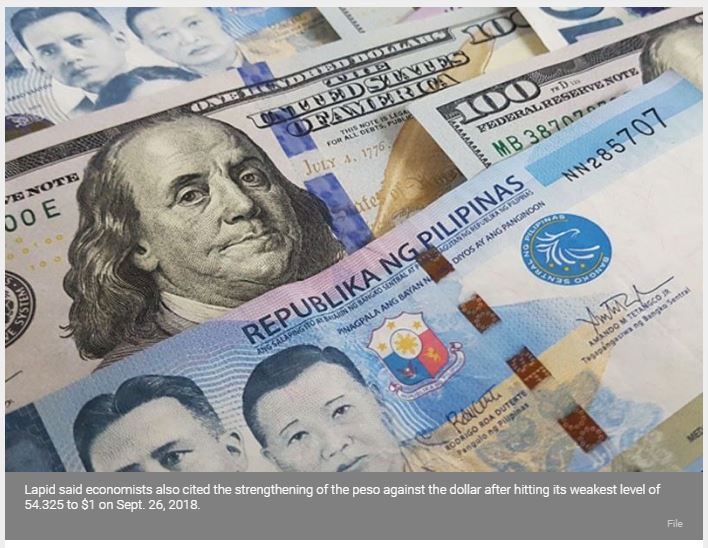Philippines: Economists see inflation above BSP’s 2 to 4% target
MANILA, Philippines — Economists of private banks still expect inflation to exceed the two to four percent target set by the Bangko Sentral ng Pilipinas (BSP) amid volatile global oil prices, geopolitical tensions, and further depreciation of the peso against the dollar.
Dennis Lapid, director of the BSP’s Department of Economic Research, said results of the central bank’s survey of private sector economists for December showed that mean inflation forecast for 2019 declined to 4.1 percent compared to 4.3 percent in the September survey.
Despite the decline, the latest forecast still exceeds the two to four percent target set by the BSP.
For 2020, Lapid said private economists penned a lower inflation forecast of 3.8 instead of 3.9 percent.
“While analysts expect inflation to remain elevated in the near term, their assessment of the balance of risks to the inflation outlook has shifted toward the downside,” Lapid said.
Bank of China Ltd sees inflation averaging 5.5 percent for 2019 and 2020, followed by Korea Exchange Bank with 5.4 percent for both years, Al Amanah Islamic Bank with five and 4.5 percent, CTBC Bank with 4.9 and 4.2 percent, and Bangkok Bank with 4.5 and four percent.
State-run Land Bank of the Philippines has the lowest inflation forecast for 2019 at 2.1 percent followed by Standard Chartered Bank, Citibank, East West Banking Corp. with 3.5 percent.
Lapid said possible downside risks to inflation include declining global oil prices; easing prices of food and non-food items, implementation of non-monetary measures to address domestic food supply issues such as rice importation as well as the recent and expected further policy rate hikes by the BSP.
Lapid said economists also cited the strengthening of the peso against the dollar after hitting its weakest level of 54.325 to $1 on Sept. 26, 2018.
On the other hand, Lapid said the key upside risks to inflation are seen to emanate from potential volatile global oil prices, possible depreciation of the peso against the dollar, increased demand due to upcoming school enrollment and during the holiday season, geopolitical risks such as trade tensions, as well as the expected rise in transport fares and utility rates.
Based on the probability distribution of the forecasts provided by 23 out of 27 respondents of the survey conducted from Dec. 7 to 10, the respondents assigned a 44.8 percent probability that inflation would fall within the BSP’s two to four percent target range and 53.6 percent chance that inflation would breach the upper end of the target.
Inflation kicked up to 5.2 percent last year from 2.9 percent in 2017 due to higher oil and food prices and weaker peso. It peaked a near-decade high of 6.7 percent in September and October but eased steadily to 5.1 percent in December.
The BSP raised interest rates by 175 basis points in five straight rate-setting meetings between May and November to prevent inflation from spiraling out of control before taking a breather in December.
BSP assistant governor Francisco Dakila earlier said the central bank has already incorporated the second tranche of increase in excise tax on oil products under Republic Act 10963 or the Tax Reform for Acceleration and Inclusion (TRAIN) Law at the start of the year.
“We already incorporated the impact of higher excise taxes on fuel so that even with the higher excise tax on fuel we expect inflation to revert back to the target range for the two years that I have mentioned,” he said.
Source: https://www.philstar.com/business/2019/01/21/1886743/economists-see-inflation-above-bsps-2-4-target#R1pF2qowXyRUgoPS.99


 Thailand
Thailand




